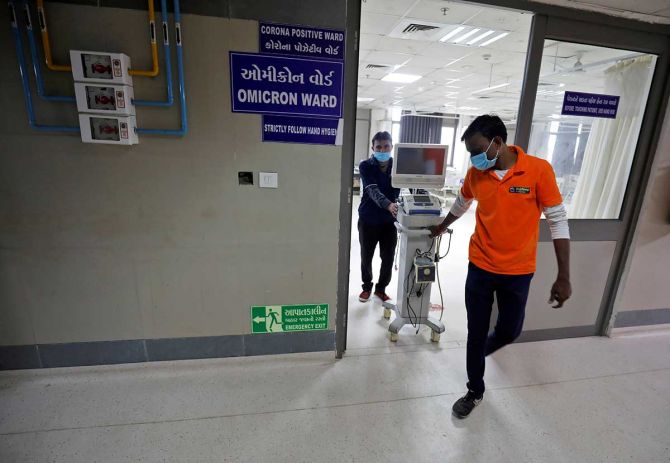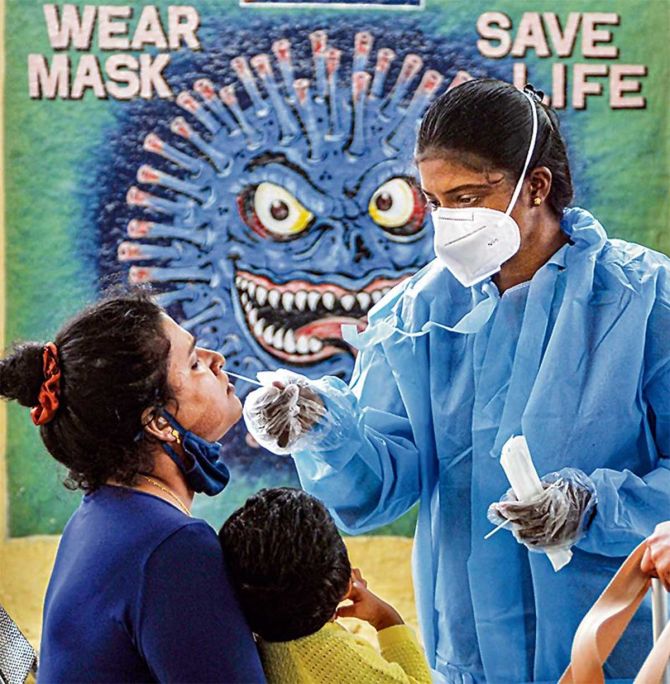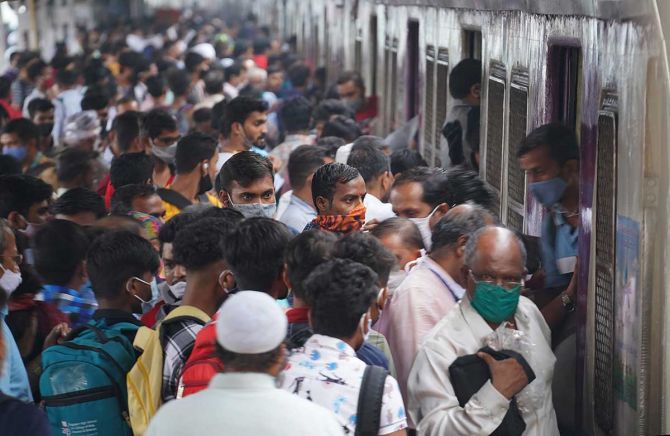'Perhaps Covid will stay with us for another a year or two before becoming a milder version.'

Dr K Srinath Reddy, President of the Public Health Foundation of India, believes the changing nature of the COVID-19 variant Omicron could well see a less virulent strain of the virus evolve.
Fears and apprehensions remain and ultimately masking and social distancing are the key words to ensure the virus does not get the better of us.
"The virus is getting progressively less virulent because it is facing resistance from vaccinated individuals, previously infected individuals and those who are wearing masks," Dr Reddy tells Rediff.com Senior Contributor Rashme Sehgal.
The World Health Organization designated Omicron as a 'variant of concern' just days after the variant was first reported in southern Africa. They did so at a time when very little was known and understood about this variant whose findings will be understood by scientists after a fortnight or more.
Were the alarm bells rung too early because now the entire globe is in a state of panic?
As far as WHO is concerned, there policy of declaring variants of concern is based on high levels of infectivity and its spread across countries.
Initially, they took their own time between January to March 2020 before declaring the original COVID-19 to be a major pandemic threat. This brought them under a fair amount of criticism.
Subsequently, they have been studying the original virus but also the behaviour of the variants in terms of infective potential as also spread across boundaries of countries. They also ought to have looked at the virulence part of it.
Labeling it as a variant of concern is based on the premise that if there is high infectivity, then many people will start getting ill, whether mild or severe.
Once this happens, health systems will get overwhelmed in trying to diagnose, test and treat patients resulting in a fair amount of threat to the functioning of social systems and the economy.
So WHO has decided that this was a variance of concern, but they should have added very clearly that the behaviour of the virus in terms of causing virulence still needed to be studied. They should have emphasised that people need to practice caution, but there was no immediate cause for panic.
The moment WHO made this announcement, alarm bells went out. Here in India our politicians started asking for a travel ban without understanding the logic of it. So although this virus is more infectious, on the basis of evidence so far received, we believe it has reduced its virulence as we expect from evolutionary biology.
India is witnessing a huge spike in Covid cases in some districts of Karnataka, Odisha and the north-east. Are these related to the Omicron virus?
It is too early to say whether these are due to Delta or Omicron, without more extensive genomic analysis.
Is the rapid spread of Omicron in South Africa related to the fact that a sizeable population in their country remain unvaccinated?
Omicron's emergence in South Africa is probably related to low levels of vaccination. However, rapid spread is related to the mutations in the virus.

This virus has spread rapidly across both under vaccinated Africa as also highly vaccinated Europe. Why is that?
Let me clarify that vaccines which are systemically administered through intra muscular injections start fighting the virus only after it has entered our respiratory tract. These vaccines are not designed to prevent infection.
This was a misconception from day one when these vaccines were administered in 2020. I have been emphasising this as have many scientists across the globe.
The way vaccine manufactures, politicians and some scientists had claimed that if we get the vaccine this will put an end to the virus is simply not true for the simple reason these vaccines helps fight off the virus only after it has infected an individual.
These vaccines are efficacious against viral illness, not against infection per se. Systemic vaccines do not prevent entry of the virus into the body (infection), but the immunity they induce fights off the virus after it has entered the body before it causes severe illness. They have shown protection of the vaccines against severe clinical illness, hospitalisation and death.
What prevents infection are masks, physical distancing and good ventilation.
Now there are other vaccines which can secrete antibodies which will help wash away the virus even after it enters the respiratory tract. Those are called mucosal vaccines, but they are still in the process of being tested and there is no assurance that they will prove to be effective.
So whether you are under vaccinated population or a highly vaccinated population, initial infection is still possible, but the impact of that will be different in the two populations.
But we are seeing a lot of deaths in Europe.
Not with Omicron. These are occurring because of the Delta variant. Europe is still facing the Delta variant attack.
Now they have to face Omicron as well.
Whatever information is available from both Africa and Europe, Omicron appears to be a mild variant.

Omicron has so many spike proteins. Moderna's CEO has said its vaccine is not so effective against this virus. The anti vaccine brigade points to his statement as one more example of the hoax being perpetrated on the public where they will be forced to take one booster after another.
Let me explain. Firstly, the mRNA vaccines or even the virus vector vaccines such as Astra Zeneca were principally focused on the spike protein that is used to attach the virus to a receptor of a cell. This is used to enter the cell and use the genetic material of the cell to make more copies of itself.
If we attack the spike protein and produce antibodies against it, these antibodies will circulate in the blood system and attach themselves to the spike protein and immobilise it.
The whole idea was to imprison the virus before it can enter the cell. That was the logic of the vaccines.
The virus also adapts itself. When it finds people are developing immunity either through natural infection or vaccine induced immunity, the virus tries to overcome this situation by developing more spike protein mutations.
When it does that, the vaccine induced immunity becomes less effective though the cellular immunity within the cell will continue to fight the virus within the infected cell.
Most vaccines have shown that vaccinated people are getting less severe infection and less deaths.
In the West they began saying we are seeing an epidemic of the less vaccinated and the unvaccinated. Whether this holds true for this virus has to be seen, but so far it appears Omicron produces less severe illness.
The virus is getting progressively less virulent because it is facing resistance from vaccinated individuals, previously infected individuals and those who are wearing masks.
It may become more transmissible, but less virulent and that is a good sign. Then we do not need to take a booster dose every year.

Do you see this happening in India?
We have developed hybrid immunity in people who have been infected and also vaccinated. Others who have been infected and not vaccinated and still others who have been vaccinated without earlier infections.
Therefore, immunity levels may be higher making the danger less.
Even if we have many infected cases we will not have a surge of seriously infected cases who need to be hospitalised.

We have now seen 25 to 26 known cases of Omicron in India. Will it spread fast given that many people do not wear masks?
I definitely see it spreading fast especially if people are careless about not protecting themselves by not masking and continue going to crowded places. Nevertheless we must differentiate between a wave of infected cases and a wave of seriously ill people.

Omicron has 32 major mutations. Should all this information have come into the public domain right at the start or should these details have been withheld?
I don't think comments about the structure of virus could have been withheld. Even the vaccines that have to be made fresh require an understanding of the genetic structure of the vaccine.
Just because there are more mutations does not mean it is more dangerous. The real danger of the virus is in the illness and death it causes. Without understanding whether it is more virulent or less virulent than Delta, we should have not come up with alarming pronouncements.
The way it was announced as though there was a new threat that could end up killing large numbers of people left the public very scared.

You have mentioned that Covaxin provides broadband protection which possibly could turn out to be more efficacious than the mRNA vaccines. Should WHO have cleared it earlier?
Firstly, we are still awaiting more information of Covaxin against the new virus. The National Institute of Immunology has found Covaxin did work against the Delta variant in a laboratory. We are waiting for reports.
It is like a natural infection. It introduces inactivated viruses to the body. The likelihood of more antigens evoking a broader immune response is very likely.
WHO raised several concerns regarding the incomplete nature of trials at the time the original permission was given by the Indian government in January 2021.
I wish WHO had cleared it earlier instead of creating so much doubt about this vaccine. I believe this vaccine with which NII is collaborating will prove effective.
 IMAGE: Dr K Srinath Reddy. Photograph: Kind courtesy Bluerasberry/wikipedia.org/Creative Commons
IMAGE: Dr K Srinath Reddy. Photograph: Kind courtesy Bluerasberry/wikipedia.org/Creative CommonsBut Zydus Cadilla has also not given full reports about its vaccine for children.
These reports are also not in the public domain. All these results have to be placed before all the concerned regulatory agencies before permission can be given.
How long will we continue to face Covid mutations one after another?
Let me put it this way. H1N I virus came in 1918 and killed 50 million people. Then it came in 2009 in a milder form. Perhaps Covid will stay with us for another a year or two before becoming a milder version.
We need to do things more sensibly. We need to stop deforestation and not allow an easy passage of forest spreading viruses to move in easily to our captive animal population and human population.
We must stop our dependence on factory farming of animals. We need to maintain ecological sensibility. We need to maintain stability of these natural barriers which prevent viruses from becoming virulent and enter human habitation.
I hope the commercial sector and industry also realise that these are existential threats that must be prevented.
Feature Presentation: Ashish Narsale/Rediff.com











 © 2025
© 2025